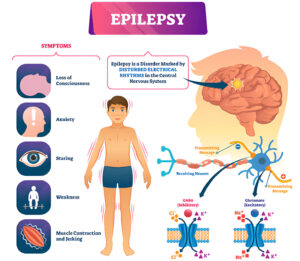Raising Children With Epilepsy can be emotionally challenging and mentally demanding, but with the right guidance, you can turn confusion into confidence. For many parents, understanding how to manage seizures, medication, school, and emotional well-being is a journey filled with learning curves.
However, with patience, planning, and proactive support, families can create a safe, encouraging, and empowering environment for their children. The following tips are designed to help parents not only cope but also thrive alongside their child’s condition.

1. Educate Yourself First
To begin with, knowledge is power. The more you understand about epilepsy, the better equipped you will be to support your child. Learning the various types of seizures, triggers, and treatment options helps you make informed decisions.
Additionally, staying updated with the latest research and connecting with epilepsy-specific organizations can provide valuable insights. Don’t hesitate to consult healthcare professionals or read trusted medical resources.
Key Actions:
-
Attend epilepsy education workshops
-
Read books or credible online sources
-
Join support groups or forums
2. Create a Detailed Seizure Action Plan
Moreover, it’s crucial to have a documented action plan that outlines what to do before, during, and after a seizure. This plan should be shared with teachers, caregivers, and anyone responsible for your child’s safety.
Having a clear protocol ensures everyone is prepared, reducing panic and enhancing response time.
Include in Your Plan:
-
Description of your child’s seizure type
-
Emergency contact numbers
-
Step-by-step response instructions
-
List of medications and dosages
3. Monitor Medications Consistently
Since medication adherence is often the foundation of seizure control, keeping a consistent schedule is vital. Make sure your child takes prescribed medications on time and in the correct dose.
In addition, be aware of side effects and report any unusual behavior or physical symptoms to your child’s neurologist promptly.
Medication Tips:
-
Use reminders or mobile apps
-
Maintain a medication diary
-
Schedule regular check-ins with your doctor
4. Identify and Avoid Triggers
Though not all seizures have identifiable triggers, many Children With Epilepsy are affected by specific factors such as lack of sleep, flashing lights, or stress. Keeping a seizure diary can help you track patterns and identify potential causes.
Over time, understanding these triggers allows you to reduce risk and adjust daily routines accordingly.
Common Triggers:
-
Fever or illness
-
Missed medication
-
Dehydration
-
Emotional stress
5. Communicate Openly With Your Child
Equally important is creating an environment where your child feels safe discussing their feelings and experiences. Encourage them to ask questions, express fears, and participate in managing their condition.
This emotional transparency helps build resilience and fosters a sense of independence.
How to Encourage Communication:
-
Use age-appropriate language
-
Validate their emotions
-
Share stories of other children managing epilepsy
6. Work Closely With the School
Transitioning from home to school can be especially tricky for Children With Epilepsy. However, collaboration with teachers, nurses, and school staff ensures your child’s safety and success in the classroom.
Make sure the school is aware of your child’s condition and that a personalized health care plan is in place.
Include in the Plan:
-
Symptoms of seizures
-
Emergency response actions
-
Activity restrictions or allowances
-
Instructions for administering medication
7. Promote a Healthy Lifestyle
As you guide your child through daily life, remember that overall wellness plays a big role in managing epilepsy. A nutritious diet, a consistent sleep schedule, and regular physical activity can help support better seizure control.
Moreover, instilling healthy habits early in life sets the stage for long-term well-being.
Health Tips:
-
Stick to a regular bedtime
-
Limit screen time, especially before sleep
-
Encourage low-risk sports like swimming or yoga
8. Plan for Emergencies Ahead of Time
Because seizures can occur unexpectedly, being prepared can make a significant difference. Keep an emergency kit with you at all times, and practice scenarios so everyone knows what to do.
Whether you’re at home, on vacation, or out running errands, readiness reduces fear and boosts confidence.
What to Pack in Your Emergency Kit:
-
Rescue medication (if prescribed)
-
Copy of your seizure action plan
-
Identification and medical alert card
-
Contact details of your neurologist
9. Connect With Support Networks
Furthermore, you’re not alone. Countless families are navigating the same journey. Connecting with other parents of Children With Epilepsy can provide emotional support, practical advice, and a sense of belonging.
Support groups and online communities can also be excellent places to share experiences, swap tips, and access expert guidance.
Consider These Resources:
-
Local hospital networks
-
Online epilepsy forums
-
Nonprofit organizations for epilepsy awareness
10. Encourage Confidence and Independence
Lastly, while it’s natural to be protective, it’s equally important to empower your child. Children who are gradually taught to manage aspects of their condition grow up to be more confident and capable.
By involving them in decisions, encouraging independence, and reinforcing their strengths, you’re helping them build a future that isn’t defined by epilepsy.
Ways to Build Confidence:
-
Let them carry their emergency card
-
Teach them how to explain their condition to others
-
Praise their efforts, not just outcomes
Conclusion: Embracing the Journey Together
In conclusion, raising Children With Epilepsy is a journey that requires education, support, and patience. While the path may seem overwhelming at times, these tips can help you create a nurturing and empowered environment for your child.
With the expertise of specialists like Dr. Vivek Mundada, who has helped families navigate the complexities of childhood neurological conditions, parents can feel reassured that professional support is available.
Ultimately, managing paediatric epilepsy is not just about controlling seizures—it’s about helping your child lead a full, joyful, and meaningful life.



